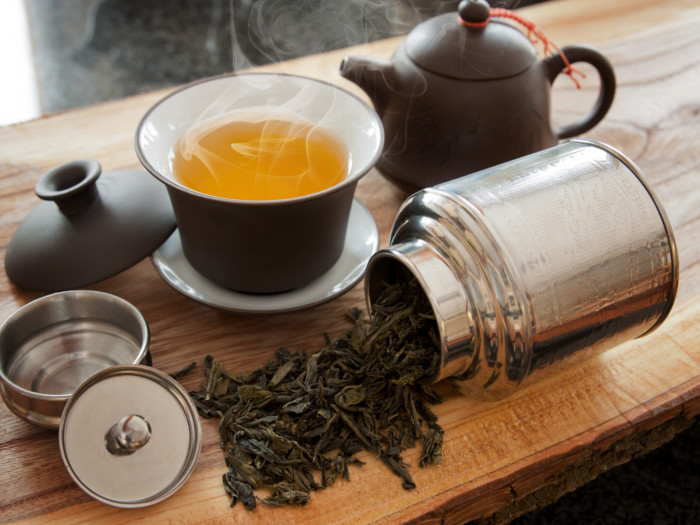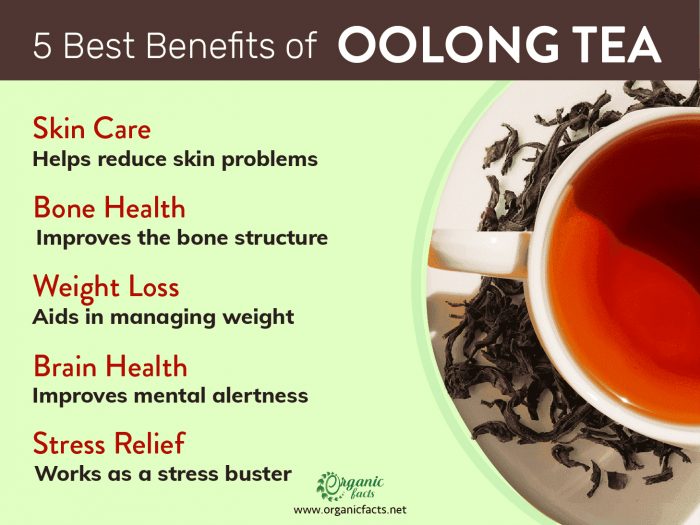Oolong tea has many amazing benefits as it helps to boost metabolism, aid in weight loss, manage type 2 diabetes, prevent cancer, help improve heart, brain, bone, and dental health. It also has the ability to treat inflammatory disorders and elevated cholesterol levels while providing vital antioxidants and robust skin.
What is Oolong Tea?
Oolong tea is fragrant and has a fruity flavor. Despite its caffeine content, it is still a relaxing drink. The health benefits of oolong tea are doubled because of the combined qualities of black tea and green tea. There are numerous kinds of tea in this world, but oolong tea is considered as one of the most beneficial types of tea.
The origin of oolong tea dates back almost 400 years when it found wide usage in China. It is a semi-green fermented tea, but the fermentation process is halted as soon as the tea leaves start to change their color.
Serving Size : Nutrient Value Water [g] 99.84 Energy 1 Energy [kJ] 2 Ash [g] 0.02 Carbohydrate, by difference [g] 0.15 Calcium, Ca [mg] 1 Magnesium, Mg [mg] 1 Phosphorus, P [mg] 1 Potassium, K [mg] 12 Sodium, Na [mg] 3 Zinc, Zn [mg] 0.01 Manganese, Mn [mg] 0.21 Niacin [mg] 0.06 Caffeine [mg] 16 Theobromine [mg] 2 Sources include : USDA [1]
Oolong Tea Nutrition Facts
This tea is a natural gift that is rich in antioxidants. According to the USDA National Nutrient Database, oolong tea contains trace amounts of vital vitamins and minerals such as calcium, manganese, copper, carotin, selenium, potassium, and magnesium. Additionally, it contains niacinamide and other detoxifying alkaloids. It is developed in semi-fermented processing, which provides the tea with numerous polyphenolic compounds and adds even more valuable health benefits. Oolong tea also contains caffeine, theophylline, and theobromine (similar to caffeine), which on excessive consumption, may stimulate the nervous system. [2]
Health Benefits of Oolong Tea
With so many health benefits, the inclusion of this tea in a balanced diet is generally a great idea. Let’s have a look at the incredible benefits of oolong tea:
Helps in Weight Loss
The polyphenolic compound found in oolong tea is may be positively linked to controlling the metabolism of fat in the body and reducing obesity. In a 2009 study published in The Chinese Journal of Integrative Medicine, 102 overweight or obese people who drank four cups of oolong tea (the brew from four 2 gram tea bags) lost weight. Twenty-two percent lost more than 3 kg (between 6-7 lbs) of weight. Moreover, all participants show a remarkable decrease in their total cholesterol and triglyceride levels. [3]
Additionally, in an animal study published in the International Journal of Obesity and Related Metabolic Disorders, the intake of oolong tea was shown to activate certain enzymes and improve the functions of fat cells. In another study, mice that were given polyphenols in addition to a high-fat and high-sugar diet still showed a decline in overall body weight and fat index. Studies show that caffeine content is an active ingredient for weight loss; the weight loss is further likely accelerated due to the polyphenols present in this tea. More research is required in this arena to truly prove the effect on humans. [4]
Controls Type-2 Diabetes

Oolong tea and tea leaves Photo Credit: Shutterstock
Oolong tea is used as an herbal brew for managing type-2 diabetic disorders and as an addition to other supplementary drugs for treating the disease. It may help regulate the amount of blood sugar and insulin in the bloodstream, so the dangerous dips and spikes in blood sugar can be reduced. Dr. Beverly Clevidence, the research leader at the USDA-funded Food Components and Health Laboratory in Beltsville, Maryland, in her study reveals that when combined with regular hyperglycemic drugs, oolong tea further balanced the blood sugar levels and prevented sudden drops in almost all of the test subjects. [5]
However, more well-designed studies in the future are needed to fully show an association.
Removes Harmful Free Radicals
The polyphenolic compound in oolong tea functions as an antioxidant and is therefore contributory in the removal of free radicals from our body. A study in 2002 journal Nutrition establishes that tea phenols help in scavenging free radicals. Therefore, consuming daily doses of oolong tea may help people against the potential harm that these free-moving cells often pose to the body, including cancer, atherosclerosis, stroke, rheumatoid arthritis, neurodegeneration, and diabetes. [7]
Improves Mental Alertness
Health benefits of oolong tea include improved mental alertness. Regular intake of caffeine-rich oolong tea may help in improving mental performance and maintaining alertness throughout the day.
Anticancer Potential
There is a well-known link between tea drinking and a lower risk of getting skin cancer. Moreover, the polyphenolic compound in oolong tea promotes apoptosis in the case of cancerous cell growth in the stomach. This polyphenolic extract also acts as a chemo-preventive instrument against the development of other cancers as well. The compounds stifle the activation of carcinogenic cells, prevent the formation of N-nitroso compounds, and trap genotoxic agents before they can become effective. [8]
Furthermore, drinking oolong tea may reduce the risk of developing ovarian cancer in women. As per The National Cancer Institute, while the precise mechanism of why tea consumption helps prevent cancer is not established, the potent antioxidant polyphenols in tea seems to have potential anti-cancer effects on human health. [9]
Skin Care
According to scientific experiments, patients diagnosed with eczema can benefit from drinking 3 cups of oolong tea throughout the day; the beneficial results of this tea can be seen in less than a week. In one study more than half of the test subjects were found to show positive, long-lasting results in terms of skin conditions after six months of daily intake of oolong tea. [10]
Atopic Dermatitis
Although the active mechanism has not been pinpointed exactly, many believe that the polyphenols present in oolong tea also work as anti-allergenic compounds. This means these compounds may help in relieving irritation and chronic skin problems like atopic dermatitis. Tea intake also brings down stress levels in the body, which may help to soothe allergies.
Improves Bone Health
The antioxidants present in oolong tea protect teeth against decay and strengthen the bone structure. A number of studies have analyzed the long-term effects of drinking this tea, particularly on bone mineral density (BMD). They showed that people who consistently drank black or oolong tea for more than 10 years were less likely to lose bone mineral density over that span of time. It is thought that some of the components in this tea actually stimulate the retention of minerals from other foods that we consume. [11]
[11]

Oolong tea is fragrant and has a fruity flavor.
Manages Stress
In a detailed study conducted at the Osaka Institute for Health Care Science in Japan, mice who consumed oolong tea showed a remarkable improvement in the stress levels up to 18 % better. The natural polyphenols in oolong tea were cited as the main cause of it being a stress-buster. There may also be an antioxidant response that provides the benefit. [12]
The amino acid L-theanine, found in tea leaves blocks the pathway of L-glutamic acid to glutamate receptors in the brain. This normally causes cortical neuron excitement leading to increased cognitive activity and neural stress responses. Since this amino acid binds to those sites, excitation doesn’t occur, and stress decreases because you are able to keep your mind at rest.
Oolong Tea Side Effects
Despite all of these important benefits, oolong tea does tend to be high in caffeine. For some people, high caffeine content may not be the healthiest component of this beneficial beverage. Caffeine affects people differently. Some of the side effects of excess caffeine are: [13]
- Anxiousness
- Headache
- Sleeplessness
- Diarrhea
- Heartburn
- Irregular heartbeat
- Confusion
More serious conditions that can be exacerbated by too much caffeine intake are diabetes, heart conditions, anxiety disorders, irritable bowel syndrome, and high blood pressure. [14]
Even though it can be beneficial to bone health, drinking too much oolong tea can actually have the opposite effect removing out excess calcium that your body is processing. For patients with osteoporosis, this can speed up bone degradation, even though other elements of oolong tea are helpful for this condition. If you have been diagnosed with this issue, it is best to discuss with a medical professional before consuming oolong tea.
While we love the taste and many health benefits of oolong tea, be aware that caffeine is a powerful chemical. Monitor your body’s response to this change in your diet, just as you should with all new foods and nutritional sources.
